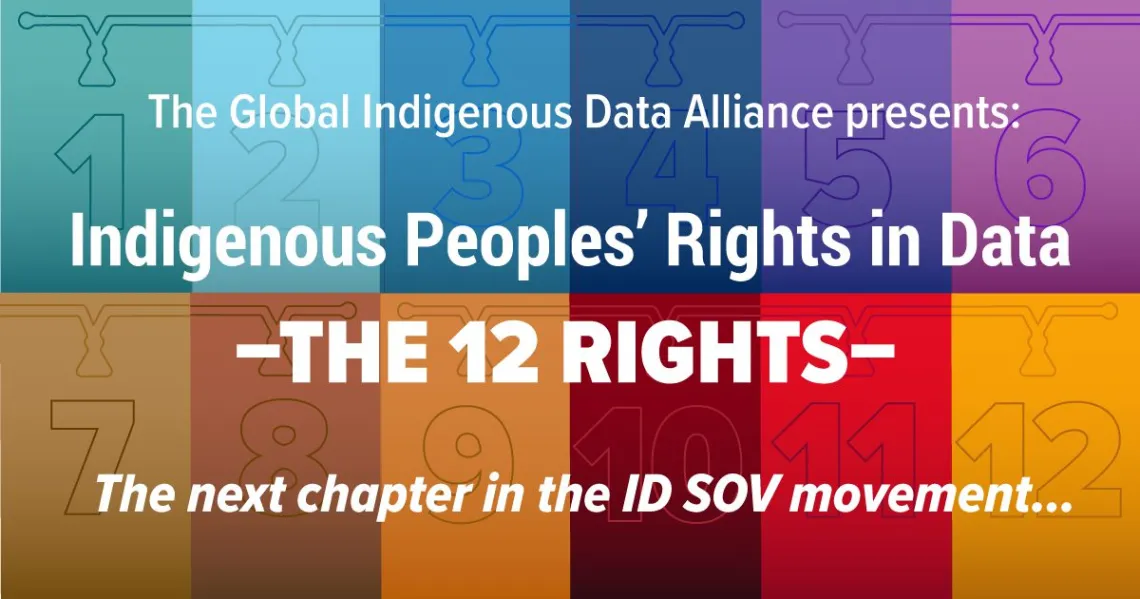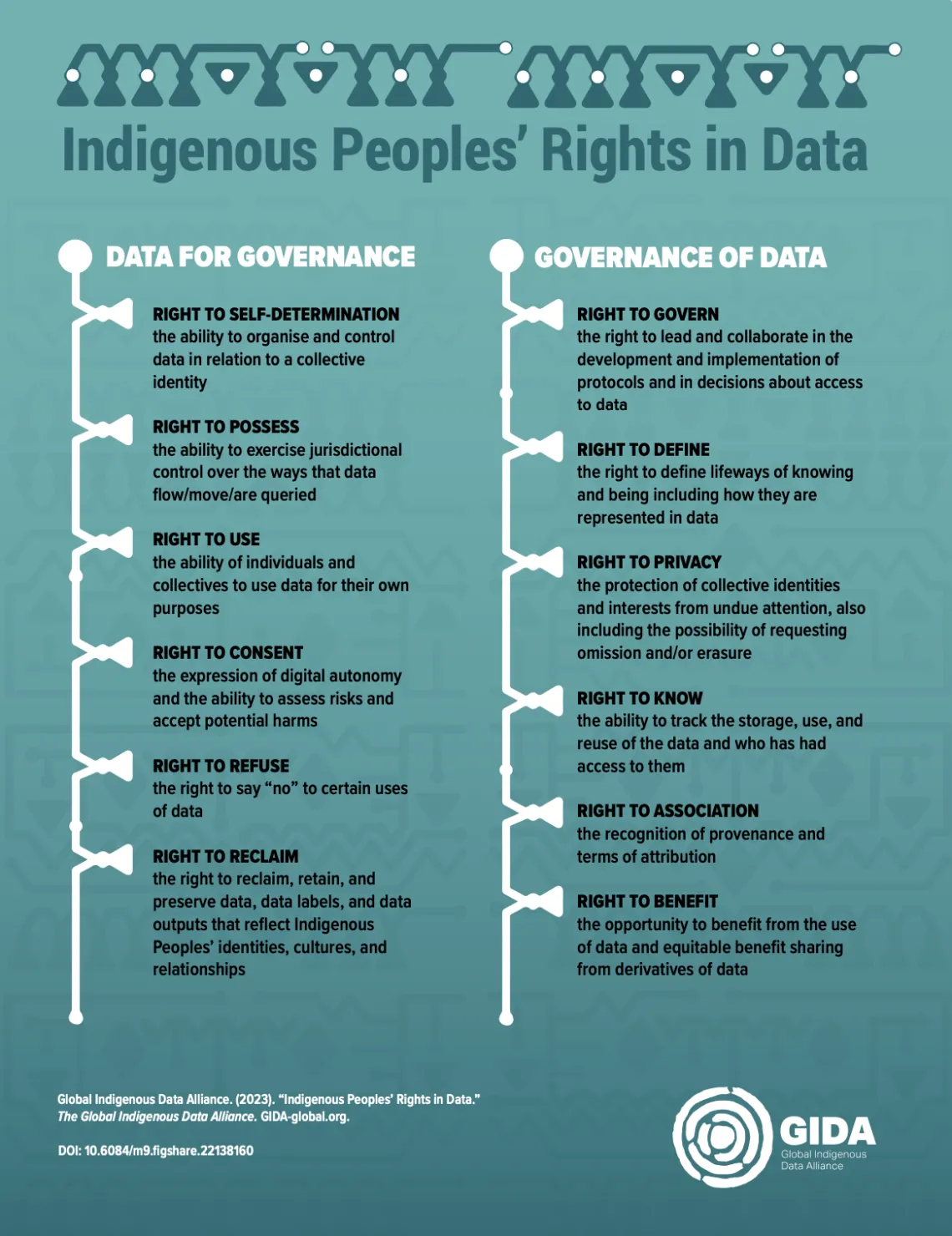‘12 Indigenous Peoples’ Rights in Data’ Defined by Global Indigenous Data Alliance
The establishment of Indigenous Peoples' Rights in data marks the next chapter in the Indigenous Data Sovereignty movement.

Native nations and Indigenous Peoples around the world are increasingly demanding that their sovereign rights be recognized and protected in an expanding array of fields, including calls for the recognition of Indigenous Network Sovereignty, Food Sovereignty, Energy Sovereignty and Data Sovereignty, to name a few.
Stephanie Russo Carroll (Ahtna & Native Village of Kluti-Kaah), Associate Director of the University of Arizona Udall Center and Assistant Professor in the Mel & Enid Zuckerman College of Public Health, has dedicated her professional life to the Indigenous Data Sovereignty (IDSov) movement since 2015. Along with an international team of research professionals, Dr. Carroll is leading the charge to ensure that Indigenous Peoples are able to control the collection, application and use of data about their citizens, lands and cultures.
The most recent step in the decades-long process of securing data rights on behalf of the 250-600 million Indigenous individuals around the world came with the publication this spring of the “12 Indigenous Peoples’ Rights in Data” by the Global Indigenous Data Alliance (GIDA), of which Carroll is a founding member and current chair.
An “Explosion of Data”
In 2019, GIDA first published their CARE Principles for Indigenous Data Governance, which were created in response to accelerating calls for the world’s data to be open and accessible for research purposes, including the widespread adoption of the “FAIR Principles” asserting that all data should be made “Findable, Accessible, Interoperable, and Reusable.”
GIDA and other Indigenous Data Sovereignty advocates recognized that these “open data'' principles were great from the standpoint of scientific advancement. However, such principles failed to recognize that data gleaned from Indigenous subjects was often extractive in nature, meaning that research involving Indigenous Peoples, lands and cultures was often used in a scientific vacuum far removed from the Indigenous subjects being studied.
This meant that, ultimately, those data often provided no benefit to the Indigenous subjects or communities themselves, and were even regularly shared and reused in stigmatizing ways without the consent of the people being studied and without consideration of the potential for disastrous consequences.
In the words of Carroll, the modern digital age has produced “an explosion of data,” the availability of which has far exceeded society’s ability to keep up in terms of standard setting and regulation. “Everybody’s playing catch up,” says Carroll, “and we as a global society don’t have the policies and practices in place to responsibly care for and use that data.”
Thus, the CARE Principles – which called for researchers to ensure that their data provided “Collective benefit,” that Indigenous subjects retain the “Authority to control” their own data, and that data be gathered and managed “Responsibly” and “Ethically” – were outlined in a way that deliberately complemented the widely adopted FAIR Principles,
The CARE Principles have since spawned dozens of academic papers in a variety of scholarly disciplines and have been adopted by international entities, national governments and nonprofit organizations, including UNESCO and the governments of Australia and New Zealand.
From “Principles” to “Rights”
But “principles,” generally speaking, are essentially “recommendations.”
Unlike laws, codes and policies, principles are not enforceable, so GIDA naturally saw a need to expand their work into an arena that had more concrete and actionable connotations. Thus, outlining Indigenous Peoples’ Rights in data seemed like the next logical step in service of advancing the IDSov movement.
The ‘12 Rights’ were identified through an inductive collaborative working group process led by the Collaboratory for Indigenous Data Governance (Collaboratory; another international IDSov organization led by Carroll) which reviewed IDSov literature and existing implementation activities.
Descriptions were then drafted and circulated for comment across the networks associated with GlDA before they were finalized and released on the GIDA-global website this spring.
The 12 Indigenous Peoples’ Rights in Data

The Rights outlined by GIDA fall under two basic headings: 1) “Data for Governance,” which primarily relates to the ability of Indigenous communities to access and use data themselves; and 2) “Governance of Data,” which relates to the ability of Indigenous communities to internally steward and externally influence the use of data.
Per the first academic paper on the 12 Rights published in the journal Frontiers in Research Metrics and Analytics in May 2023, the “12 Indigenous Peoples’ Rights in Data” include:
Data for Governance:
- Right to self-determination: the ability to organize and control data in relation to a collective identity
- Right to reclaim: the right to reclaim, retain, and preserve data, data labels, and data outputs that reflect Indigenous Peoples' identities, cultures, and relationships
- Right to possess: the ability to exercise jurisdictional control over the ways that data flow/move/are queried
- Right to use: the ability of individuals and collectives to use data for their own purposes
- Right to consent: the expression of digital autonomy and the ability to assess risks and accept potential harms
- Right to refuse: the right to say “no” to certain uses of data
Governance of Data
- Right to govern: the right to lead and collaborate in the development and implementation of protocols and in decisions about access to data
- Right to define: the right to define lifeways of knowing and being including how they are represented in data
- Right to privacy: the protection of collective identities and interests from undue attention, also including the possibility of requesting omission and/or erasure
- Right to know: the ability to track the storage, use, and reuse of the data and who has had access to them
- Right to association: the recognition of provenance and terms of attribution
- Right to benefit: the opportunity to benefit from the use of data and equitable benefit sharing from derivatives of data
“Indigenous Peoples have these rights regardless of whether or not they are acknowledged by existing laws,” explains Carroll. And, now that they've been named, the GIDA and Collaboratory teams have set out to disseminate them to the research world with the hope that they will be recognized, normalized and, eventually, encoded by researchers, institutions and funding organizations, writ large.

